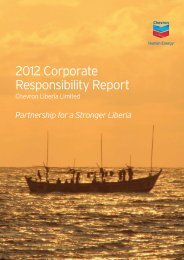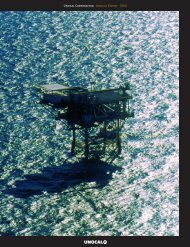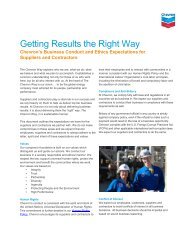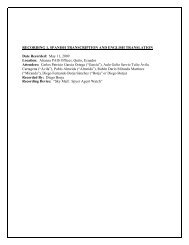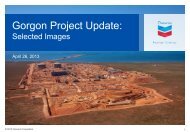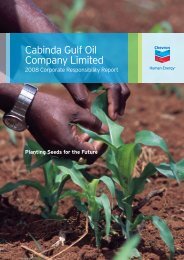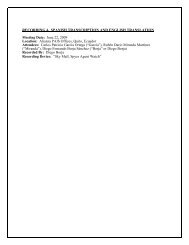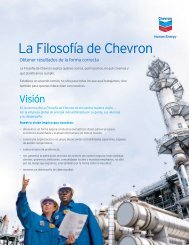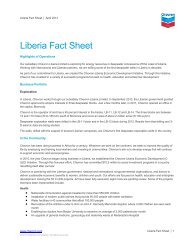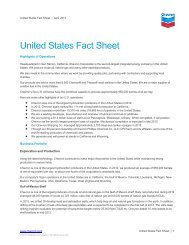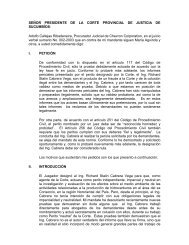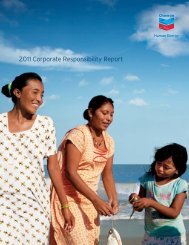Download PDF - Chevron
Download PDF - Chevron
Download PDF - Chevron
Create successful ePaper yourself
Turn your PDF publications into a flip-book with our unique Google optimized e-Paper software.
2002 <strong>Chevron</strong>Texaco Corporate Responsibility Report Environmental IssuesAir EmissionsManaging Our EmissionsLike all energy companies, <strong>Chevron</strong>Texaco’s operations produce emissionssuch as sulfur oxides, nitrogen oxides, volatile organic compoundsand carbon monoxide, which can contribute to local and regional airpollution. Through our Operational Excellence Management System, werequire our business units to track current air emissions, forecast futureemissions, and minimize the environmental and health risks associatedwith those emissions. We do not collect corporatewide, nongreenhousegas air emissions data.U.S. Refining EmissionsTons per millionbarrels processed453525155099 00 01 02Tons per millionbarrels processed(left scale)Note:NOxSOxVOCThousands oftons per year1612Tons per year(right scale)NOxSOxVOCNOx = nitrogen oxidesSOx = sulfur oxidesVOC = volatile organic compounds840<strong>Chevron</strong>Texaco designs newfacilities using guidelines andprocesses to minimize air emissionsonce the facilities are operating.We also add emissioncontrol equipment to existingfacilities. In many cases, thiscontrol equipment is installedto comply with local and nationalgovernmental requirements,although in some instances wehave gone beyond regulatoryrequirements. In most of our U.S.marketing terminals, for example,we have installed controls thattypically reduce volatile organiccompounds emissions beyondwhat is required by regulations.In the United States, our refinerieshave made improvements in controlling emissions of volatile organiccompounds and nitrogen oxides over the past several years. The netincrease in sulfur oxide emissions over the period is primarily due tovariability in refinery operations and the types of crude oils processed.Reducing Emissions from Our ProductsIn addition to air emissions from our own operations, we also are workingto minimize the air emissions produced when our fuel products areused. <strong>Chevron</strong>Texaco has undertaken a range of activities to developsuch cleaner fuels:> We have been an industry leader in gasoline detergent additive technology,which reduces vehicle emissions by reducing engine deposits.Since 1973, U.S. automakers have used <strong>Chevron</strong> gasoline with ourdeposit control technology to help certify their vehicles comply withU.S. Environmental Protection Agency emission standards.> Company researchers have worked extensively with oil and autoindustry research organizations to characterize engine emissions, theeffects of vehicle design and fuels on these emissions, and the effectsof these emissions on air quality.> We have worked with the U.S. EPA in its efforts to reduce sulfurcontent of fuels to reduce emissions from combustion of theseproducts. <strong>Chevron</strong>Texaco plans to produce low-sulfur fuels wellahead of EPA deadlines.> Outside the United States, <strong>Chevron</strong>Texaco plans to deliver low-sulfurproducts in specific markets in Asia, the Middle East and Africa.> We have been an advocate of producing unleaded gasoline ahead ofgovernment mandates and have worked on this issue with governmentsin Vietnam, South Africa and Kenya.> We are members of the International Petroleum Industry EnvironmentalConservation Association and the American PetroleumInstitute, both of which are working with the Partnership for CleanFuels and Vehicles. This global partnership, established in 2002 atthe World Summit for Sustainable Development, is supporting thephaseout of lead from fuels around the world and the reduction ofsulfur in gasoline and diesel fuel as advanced vehicle emission controlsare introduced.© 2003 <strong>Chevron</strong>Texaco Corporation. All Rights Reserved.44



